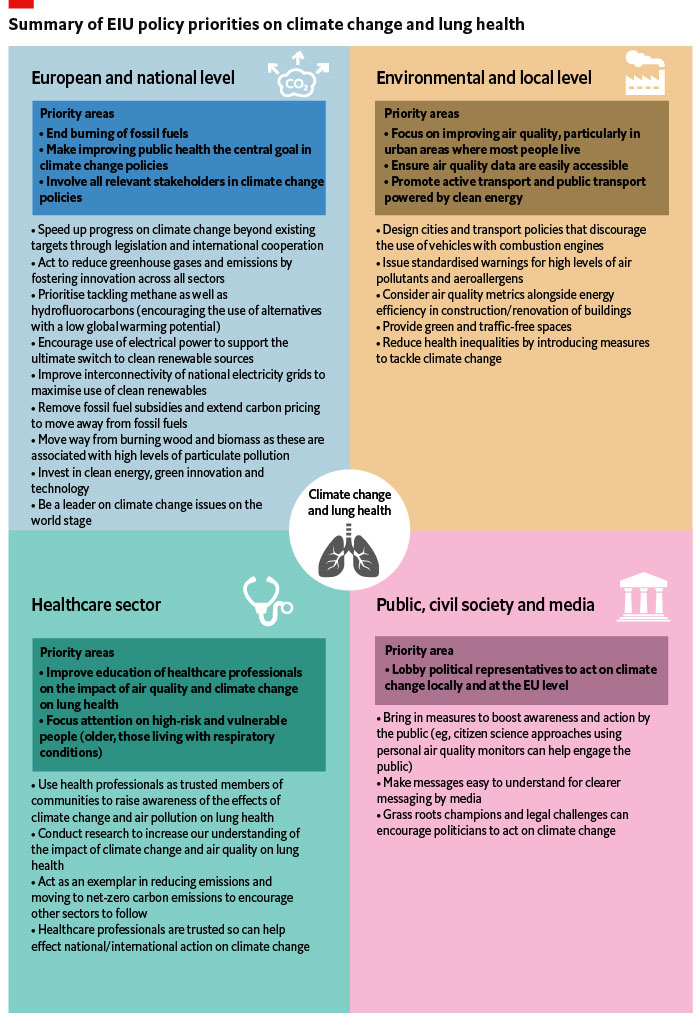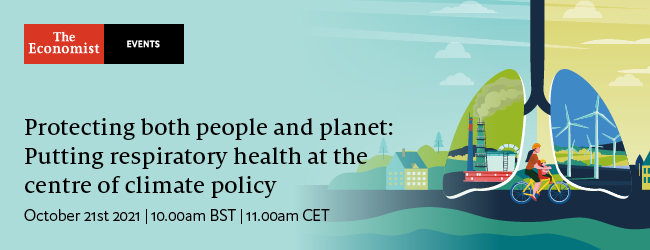Climate change is a health issue with particular effects on respiratory health. This research summarises the direct and indirect evidence that links climate change to lung health and maps out policy priorities to prevent and curb the effects of climate change on lung health.
This independent report is the result of multiple research phases. First, we conducted a pragmatic literature review of the evidence and policy frameworks across the academic and grey literature to develop an initial set of policy priorities. Second, we convened an advisory board on May 19, 2021, drawn from the academic, climate change, environment and healthcare sectors, whose advice shaped the priorities of the study and the content of the report. Third, we conducted 12 interviews with respiratory clinicians, academics, policymakers and climate change and health experts to obtain an in-depth view of the issues involved. Finally, supporting the research, and feeding into this publication, has been substantial desk research.
There is evidence that emissions linked to global warming have an adverse impact on respiratory health, in particular emissions from combustion of fossil fuels and biomass by power stations, industry, homes and vehicles.
The need for action is recognized by the environmental sector and increasingly by the heath sector and the European general public, who are also beginning to demand tougher action. More awareness of climate change’s impact on lung health among these groups is vital for effecting change.
There is only so much one engaged individual can do in terms of cutting emissions and living sustainably. Mass change is needed, and most importantly the policies and systems in societies—controlled by governments and public authorities—need to support efforts to reduce emissions and tackle climate change.
Increasing awareness among the health sector and the general public of the need for urgent action on climate change is the path to achieving it by putting pressure on politicians to act.

Our thanks are due to the following for their time and contribution (listed alphabetically by surname):
Advisory board members
- Isabella Annesi-Maesano, research director at the French NIH (INSERM) and deputy director of the Desbrest Institute of Epidemiology and Public Health (IDESP), INSERM and University of Montpellier, France
- Nicholas Hopkinson, National Heart and Lung Institute, Imperial College London, UK
- Dan McDougall, senior fellow, Climate and Clean Air Coalition
- Mariam Maglakelidze, dean of the School of Medicine, Petre Shotadze Tbilisi Medical Academy, Georgia
- James Milner, assistant professor, London School of Hygiene and Tropical Medicine, UK
- Susanna Palkonen, director, European Federation of Allergy and Airways Diseases Patients Association
- Gerardo Sanchez Martinez, expert in the environment, health and wellbeing, European Environment Agency
- Paul Wilkinson, professor of environmental epidemiology at the London School of Hygiene and Tropical Medicine, UK
Interviewees
- Isabella Annesi-Maesano, research director at the French NIH (INSERM) and deputy director of the Desbrest Institute of Epidemiology and Public Health (IDESP), INSERM and University of Montpellier, France
- Nathan Borgford-Parnell, scientific affairs co-ordinator, Climate and Clean Air Coalition
- Nicolás González Casares, MEP, Spain (Spanish Socialist Worker’s Party, Group of the Progressive Alliance of Socialists and Democrats); member of the Special Committee on Beating Cancer
- Sandra Cavalieri, urban health initiative coordinator, Climate and Clean Air Coalition
- Tiy Chung, communications officer, Climate and Clean Air Coalition
- Gennaro D’Amato, professor of respiratory medicine, University of Naples Federico II; director, division of respiratory diseases and allergy, High Specialty Hospital A. Cardarelli, Napoli, Italy, and member of the G7 International Committee on Climate Change and Health
- Vijoleta Gordeljevic, health and climate change coordinator, The Health and Environment Alliance
- Frank Kelly, Battcock Chair in Community Health and Policy, Faculty of Medicine, School of Public Health, Imperial College London
- Sean Kelly, MEP, Ireland (Fine Gael, Group of the European People’s Party); member of the Lung Health Group
- James Milner, assistant professor, London School of Hygiene and Tropical Medicine, UK
- Gerardo Sanchez Martinez, expert in the environment, health and wellbeing, European Environment Agency
- Anne Stauffer, director for strategy and campaigns, The Health and Environment Alliance
Join us for a webinar to discuss the report findings:






